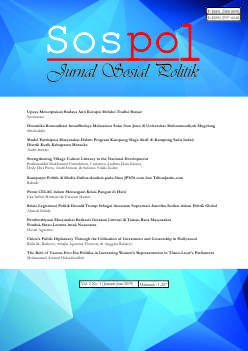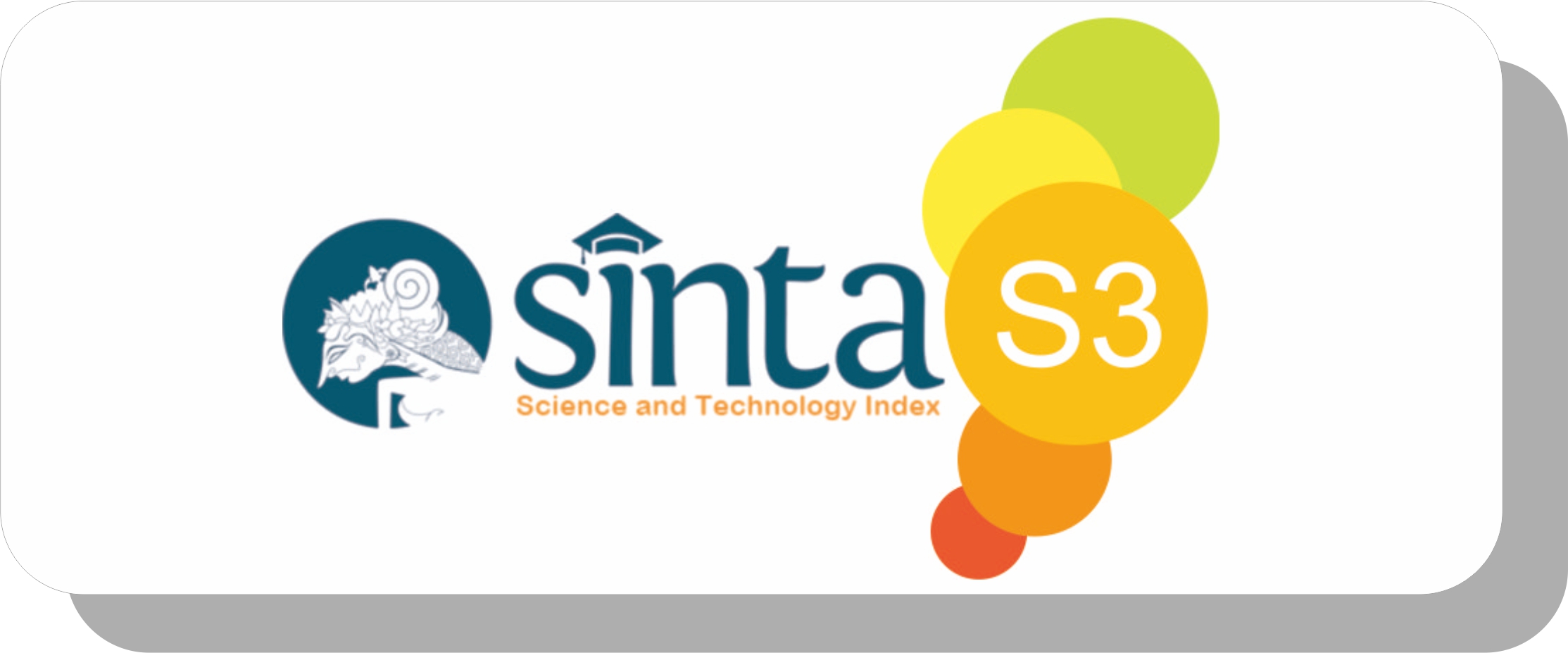Strengthening Village Culture Literacy in the National Development
DOI:
https://doi.org/10.22219/sospol.v5i1.7033Keywords:
culture, development, literacy, villageAbstract
Cultural literacy is needed as an element of development in development administration. Values in culture, especially village communities have long been a factor forming social structures in the village and are able to play a role in maintaining the preservation of environmental ecosystems. However, cultural problems in the village have long existed before the government's cultural development policies were implemented. The purpose of this paper provides a broader space to translate village culture to the lowest level into the development process because villages in the context of modernization have a vulnerability to traditions that have been carried out for generations. The research uses library research. The results of the discussion show that communication and interaction within the family contribute to strengthening local language culture and habits that are taught from generation to next generation. Culture formed by families is able to filter out social change. In addition, the diversity of cultures in the village has become a unique opportunity for the consistency of cultural development with a tolerance base amid the swift capitalism / modernization that has a universal cultural impact. Thus, these two aspects are steps in the people center development to be considered in cultural development in the village.
Downloads
References
Journal
Agusta, I. (2007). Indonesia dalam Pertautan Budaya Pembangunan dan Budaya Warga Desa. Wacana, 9(2), 136–140. retreived from Retreived from journal.ui.ac.id/index.php/wacana/article/view/2584 at 24 August 2018
Anggraini, G. (2016). Internalisasi Nilai-Nilai Pendidikan Karakter pada Masyarakat Adat Dayak Ngaju. RJOAS 5(77) Vol. 10 (2) 238 – 242 DOI https://doi.org/10.18551/rjoas.2018-05.29 at 11 December 2018
Ekosiswoyo, R., Joko, T., & Suminar, T. (2016). Potensi Keluarga dalam Pendidikan Holistik Berbasis Karakter pada Anak Usia Dini. EDUKASI, Vol 1(1) 50-68 retrieved from https://journal.unnes.ac.id/nju/index.php/edukasi/ article/view/952/889 at 22 April 2019
Faturahman, B. M. (2017). Pemetaan Potensi Wilayah untuk Menunjang Kebijakan Pangan Kabupaten Pacitan. JISPO, 7(2), 43–62. Reteived from https://journal.uinsgd.ac.id/index.php/jispo/article/view/2271 at 6 October 2018
Faturahman, B. M. (2018a). Aktualisasi Nilai Demokrasi dalam Perekrutan dan Penjaringan Perangkat Desa. SOSPOL, 4(1), 132–148. Retreived from http://ejournal.umm.ac.id/index.php/sospol/article/view/5557 at 15 September 2018
Faturahman, B. M. (2018b). Kepemimpinan dalam Budaya Organisasi. MADANI, 10(1), 1–11. Retreived from http://e-jurnal.unisda.ac.id/index.php/MADANI/article/view/186 at 20 April 2018
Fitriyani, A., Suryadi, K., & Syam, S. (2015). Peran Keluarga dalam Mengembangkan Nilai Budaya Sunda (Studi Deskriptif terhadap Keluarga Sunda di Komplek Perum Riung Bandung). Jurnal Sosietas, Vol. 5 (2) 1-9 retrieved from http://ejournal.upi.edu/index.php/sosietas/article/view/1521/1047 at 18 april 2019.
Haryono, T., J., S. (1999). Dampak Urbanisasi Terhadap Masyarakat di Daerah Asal. Masyarakat, Kebudayaan dan Politik, Th XII, No 4, Oktober 1999, 67-78. Retrieved from http://journal.unair.ac.id/download-fullpapers-07-Trijoko.pdf at 18 april 2019.
Khumairo, A. (2017). Konseling Keluarga dalam Mengembangkan Nilai-Nilai Kearifan Lokal Pada Pola Pikir Anak. Elementary Vol. 3 Edisi Januari-Juni 61-71 retreived from http://dx.doi.org/10.32332/elementary.v3i1.789 at 12 December 2018
Panjaitan, L.,M. & Sundawa, D. (2016). Pelestarian Nilai-Nilai Civic Culture dalam Memperkuat Identitas Budaya Masyarakat: Makna Simbolik Ulos dalam Pelaksanaan Perkawinan Masyarakat Batak Toba di Sitorang. Journal of Urban Society’s Art Volume 3 (2) 64-72 retrieved from http://journal.isi.ac.id/index.php/JOUSA/article/download/1481/326 at 27 April 2019.
Rusmana, A., Rizal, E., & Khadijah, U. L. (2018). Literasi Sosial Budaya Masyarakat Penyangga Hutan Terhadap Pelestarian Taman Nasional Gunung Gede Halimun Salak (TNGHS). Record and Library Journal, 3(2), 116–126. Retreived from https://doi.org/10.20473/rlj.V3-I2.2017.116-126 at 14 November 2018
Saepudin, Damayani, & Rusmana (2018). Model literasi budaya masyarakat Tatar Karang di Kecamatan Cipatujah Kabupaten Tasikmalaya. Berkala Ilmu Perpustakaan dan Informasi, Vol. 14, No. 1, Juni 2018, Hal. 1-10 retreived from https://jurnal.ugm.ac.id/bip/article/view/33315 DOI: 10.22146/bip.33315. at 15 November 2018
Siregar, S,. M., & Nadiroh. (2016) Peran Keluarga Dalam Menerapkan Nilai Budaya Suku Sasak Dalam Memelihara Lingkungan. JGG- Jurnal Green Growth dan Manajemen Lingkungan Vol.5 No.2. reeived from journal.unj.ac.id/unj/index.php/jgg/article/view/3516 DOI : doi.org/10.21009/jgg.052.04 at 11 November 2018
Sugiyarto, S. (2017). Menyimak (Kembali) Integrasi Budaya di Tanah Batak Toba. Endogami: Jurnal Ilmiah Kajian Antropologi. vol. 1(1) (34-41) retrieved fromhttps://ejournal.undip.ac.id/index.php/endogami/article/view/16836 at 27 April 2019
Winarni, O. F. (1995). Dinamika Penerapan Model-Model Pembangunan Dan Sistem Administrasi Pendukungnya. Cakrawala Pendidikan Nomor, 2, 79–91. Retrieved from http://journal.uny.ac.id/index.php/cp/article/download/9180/pdf. at 12 October 2018
Books
Asay, S., M., & DeFrain, J. (2012). The International Family Strengths Model. Madrid, World Congress of Families VI. Retrieved from http://congresomundial.es/wp-content/uploads/Sylvia-Asay-The-International-Family-Strengths-Model-ENGLISH.pdf at 18 april 2019
Glauben, T., Herzfeld, T., Rozelle, S., Wang, X. (2012). Persistent Poverty in Rural China: Where, Why, and How to Escape?. Leibniz Institute of Agricultural Development in Transition Economies (IAMO), Halle (Saale) retrieved fromhttps://www.econstor.eu/bitstream/10419/149557/1/Glauben_2012_Persistent_poverty.pdf at 22 November 2018
Hatta, M. (2002). Pengantar ke Jalan Sosiologi Ekonomi. Jakarta: Gunung Agung.
Kemdikbud. (2017). Panduan Gerakan Literasi Nasional. Jakarta, Kementerian Pendidikan dan Kebudayaan. Retreived from gln.kemdikbud.go.id/glnsite/wp-content/uploads/2017/08/panduan-gln.pdf ar 11 November 2018
Kemdikbud. (2016). Analisis Kearifan Lokal Ditinjau Dari Keragaman Budaya Tahun 2016. Jakarta, PDSPK Kemdikbud RI.
Kemdikbud. (2015). Rencana Strategis Kementerian Pendidikan dan Kebudayaan 2015-2019. Jakarta, Kemdikbud.
Klu, F.E. (1984). Regional Theory: Towards a Paradigm Shift. Monrovia: Departement of Geography, University of Liberia.
Muhi, A., H. (2011). Fenomena Pembangunan Desa. Jatinangor. Institut Pemerintahan Dalam Negeri.
Osborne D. & Gaebler T. (2005). Reinventing Government : How the Entreprenuerial Spririt in Transforming the Public Sector, Di Indonesiakan oleh Abdul Rosyid, Lembaga Manajemen PPM, Jakarta.
Permatasari, A. (2015). Membangun Kualitas Bangsa dengan Budaya Literasi Prosiding Seminar Nasional Bulan Bahasa UNIB 2015. Universitas Muhammadiyah Yogyakarta.
Ridwan. (2007). Landasan Keilmuan Kearifan Lokal. Purwokerto: P3M STAIN
Rostow, W.,W. (1960). The Stages of Economic Growth: A NON-Communist Manifesto. London: Cambridge University Press.
Sajogyo. (2006). Ekososiologi: Deideologisasi Teori, Restrukturisasi Aksi (Petani dan Perdesaan sebagai Kasus Uji). Yogyakarta: Cindelaras.
Siagian, S., P. (2009). Administrasi Pembangunan; Konsep, Dimensi dan Strateginya. Bumi Aksara. Jakarta
Sudjatmiko, B. (2015). Desa Kuat Indonesia Hebat. Jakarta: Pustaka Yustisia.
Surbakti, R. (2000). Politik Desentralisasi dan Demokratisasi. Jakarta, IIP.
Tjokrowinoto, M. (1987). Politik Pembangunan: Sebuah Analisis, Konsep, Arah dan Strategi. Yogyakarta: Tiara Wacana
UNDP Indonesia. (2017). Indeks Pembangunan Manusia Indonesia Meningkat tapi Kesenjangan Masih Tetap Ada. Retrieved from http://www.id.undp.org/content/dam/indonesia/2017/doc/INS-2016_human_development_report.pdf at 10 December 2018
Zed, Mestika. (2008). Metode Penelitiaan Kepustakaan. Jakarta: Yayasan Obor
Regulation
Kementerian Sekretariat Negara RI Nomor 6 Tahun 2014 tentang Desa, Tanggal 15 Januari 2014.
Online Article
Kemdikbud. (2016). Profil Kebudayaan Indonesia. Pusat Data dan Statistik Pendidikan dan Kebudayaan (PDSPK). Retreived from http://sdm.data.kemdikbud.go.id/upload/files/8.%20Presentasi%20Profil%20Kebudayaan%2017%20Nop%202016.pdf at 22 July 2019.
Thalib, U. (2009). Kajian Pembangunan Berbasis Komunitas Studi Kasus Di Daerah Maluku, 1–19. Retreived from https://kebudayaan.kemdikbud.go.id/bpnbmaluku/kajian-pembangunan-berbasis-komunitas-studi-kasus-daerah-maluku/ at 10 December 2018
Downloads
Published
How to Cite
Issue
Section
License
Authors who publish with this journal agree to the following terms:
- Authors retain copyright and grant the journal right of first publication with the work simultaneously licensed under a Creative Commons Attribution-ShareAlike 4.0 International License that allows others to share the work with an acknowledgement of the work's authorship and initial publication in this journal.
- Authors are able to enter into separate, additional contractual arrangements for the non-exclusive distribution of the journal's published version of the work (e.g., post it to an institutional repository or publish it in a book), with an acknowledgement of its initial publication in this journal.
- Authors are permitted and encouraged to post their work online (e.g., in institutional repositories or on their website) prior to and during the submission process, as it can lead to productive exchanges, as well as earlier and greater citation of published work (See The Effect of Open Access).

This work is licensed under a Creative Commons Attribution-ShareAlike 4.0 International License.



















